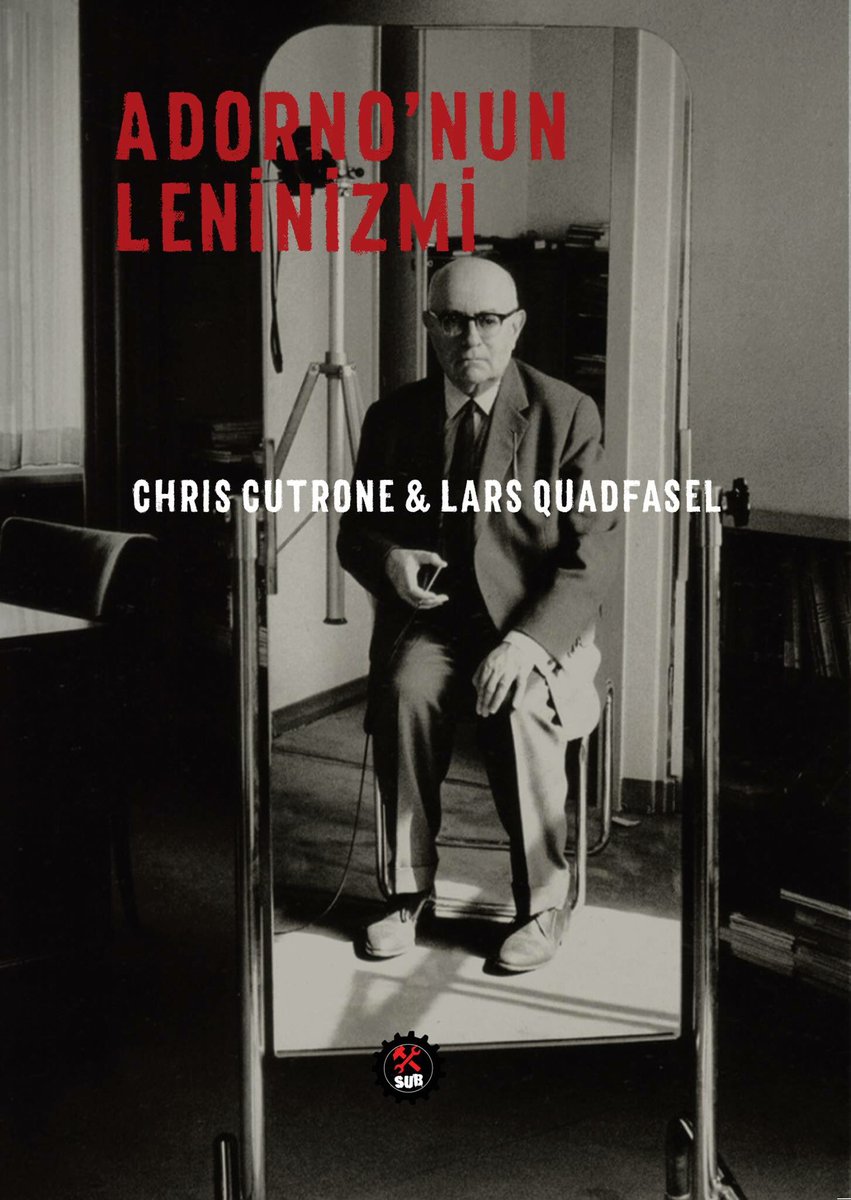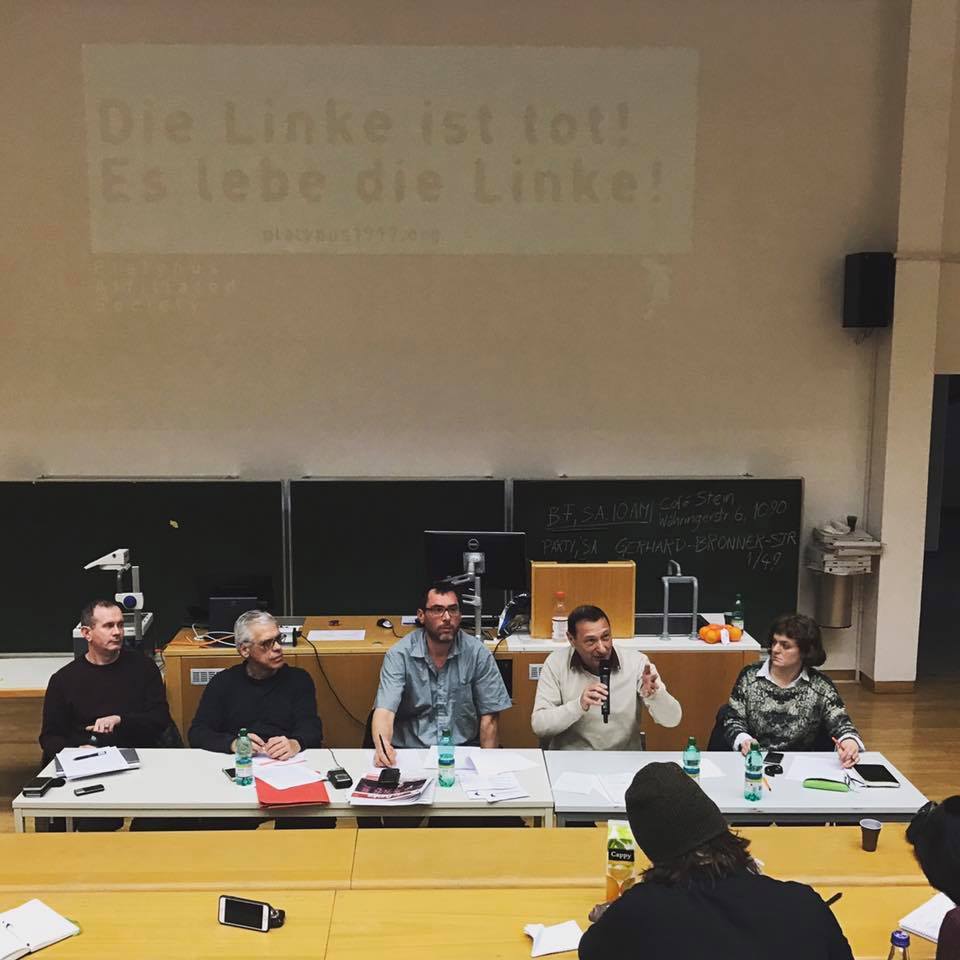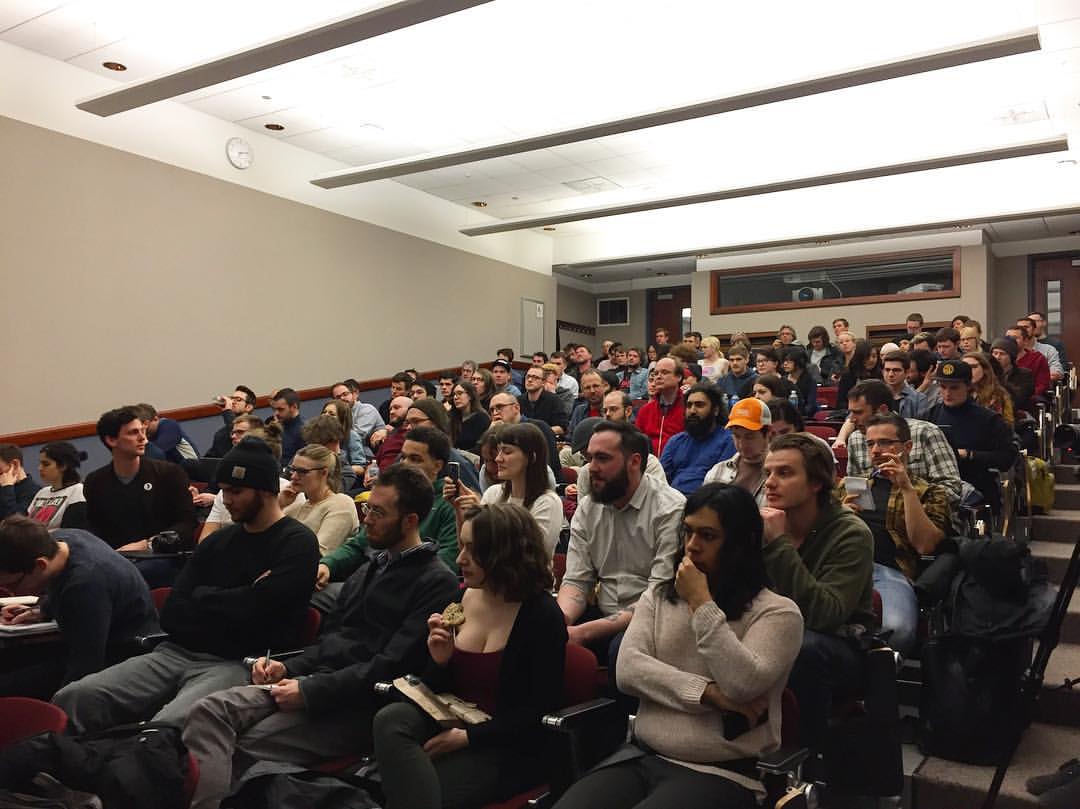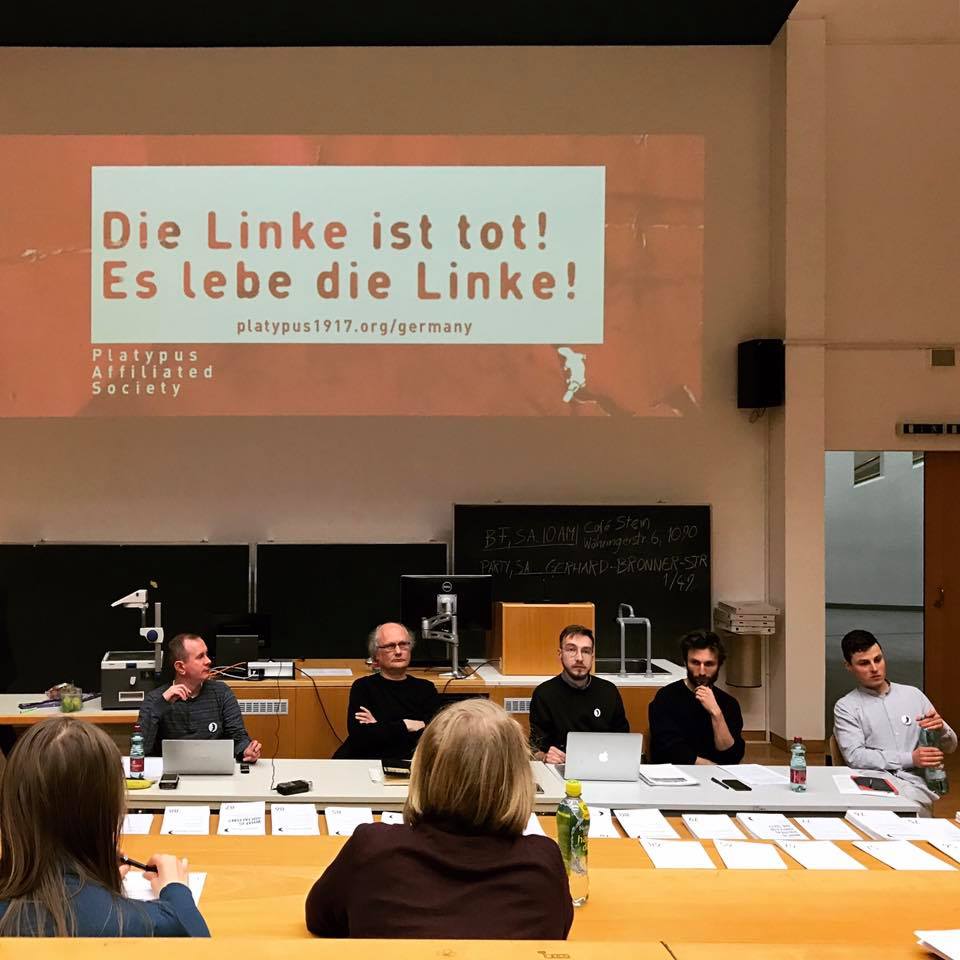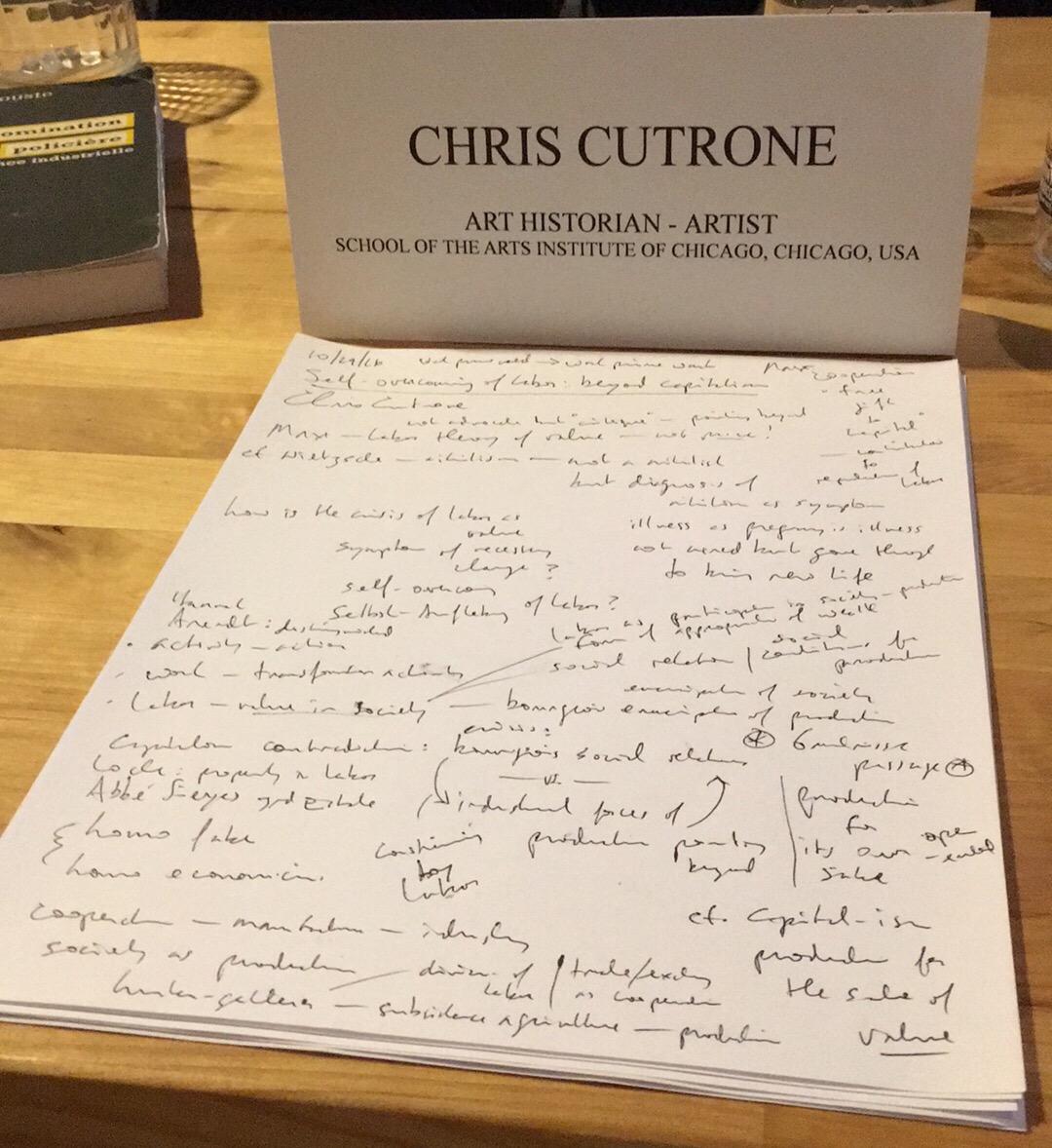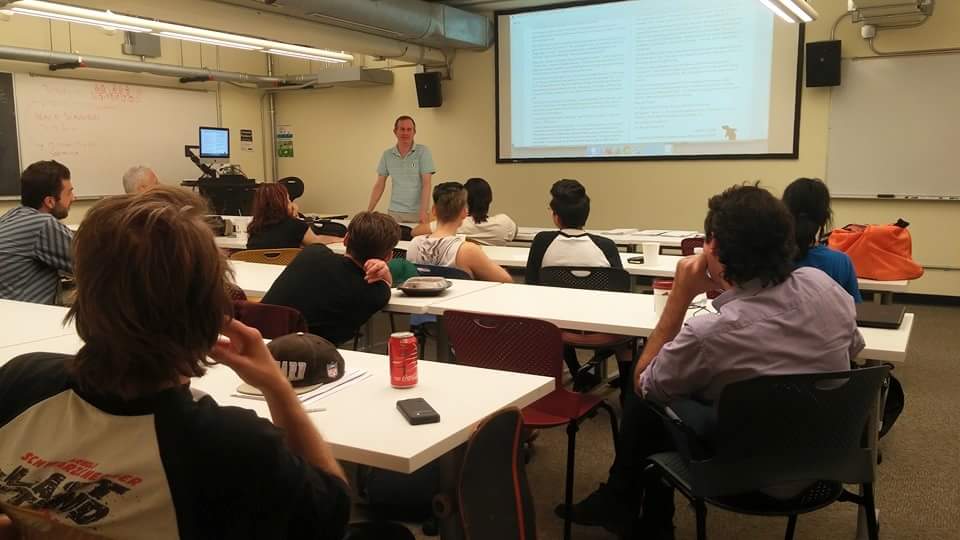Platypus Review #91 | November 2016
Immanent critique
Whenever approaching any phenomenon, Adorno’s procedure is one of immanent dialectical critique. The phenomenon is treated as not accidental or arbitrary but as a necessary form of appearance that points beyond itself, indicating conditions of possibility for change. It is a phenomenon of the necessity for change. The conditions of possibility for change indicated by the phenomenon in question are explored immanently, from within. The possibility for change is indicated by a phenomenon’s self-contradictions, which unfold from within itself, from its own movement, and develop from within its historical moment.
Everything is taken not merely as it “is,” as it happens to exist, but rather as it “ought” to be, as it could and should be, yielding as-yet unrealized potentials and possibilities. So it is with “authoritarianism,” in Adorno’s view. For Adorno, the key is how psychological authoritarianism is self-contradictory and points beyond itself. Adorno is interested in the “actuality” of authoritarianism: as Wilhelm Reich put it, the “progressive character of fascism;”[1] as Walter Benjamin put it, the “positive concept of barbarism.”[2]
This demands a critical approach rather than a merely descriptive or analytically positive or affirmative approach. For something can be affirmed either in its justification and legitimation or in its denunciation. In either case, the phenomenon is left as it is; whereas, for Adorno, as a Marxist, “the point is to change it.”[3]
So, what possibilities for change are indicated by authoritarianism, and how are such possibilities pointed to by the categories of Freudian psychoanalysis? For Adorno, it is unfortunate that social contradiction has passed from ideology and politics in society to individual psychology (indeed, this expresses a political failure), but there it is.[4] The “F-scale” is misleading, as Adorno notes, in that it might — despite its being posed as a “scale” — be mistaken for a matter of difference in kind rather than degree. Meaning that, for Adorno, everyone is more or less susceptible to fascism — everyone is more or less authoritarian.
The competing aspects of the individual psyche between liberal individuality and authoritarian tendencies is itself the self-contradiction of authoritarianism Adorno sought to explore. In capitalism, liberalism is the flip-side of the same coin as fascism. Individualism and collectivism are an antinomy that express capitalist contradiction. For individualism violates true individuality and collectivism violates the true potential of the social collectivity. Individuality and collectivity remain unfulfilled desiderata, the aspirations and goals of bourgeois society, its emancipatory promise. For Adorno (as for Marx), both are travestied in capitalism — mere “shams.”

Donald Trump rally, Pensacola, Florida, January 15, 2016.
Authoritarianism is an expression of that travesty of society. Fascism is the sham collectivity in which the sham individuality hides itself; just as liberalism is the sham individuality that conceals the collective condition of society. That collective condition is not a state of being but the task of the need for socialism beyond capitalism. Fascism as well as liberalism expresses that unfulfilled need and tasking demand for socialism in capitalism.
So what would it mean to critique authoritarianism in an immanently dialectical manner? What is the critical value of authoritarianism, in Adorno’s view? How can the potential possibility pointing beyond capitalism be expressed by authoritarianism and revealed rather than concealed by individual psychology? How is society critically revealed in authoritarianism, pointing to socialism?
Psychology
In “Sociology and psychology”[5] Adorno diagnoses the division of psychology from sociology as itself a symptom of contradiction in society — of the actual separation and contradiction of the individual and the collective in capitalism.
In The Authoritarian Personality,[6] Adorno et al. wrote that the fascist personality was characterized by identification with technology, the love for instruments as “equipment.” Here, Adorno found the emancipatory potential beyond capitalism precisely in such identification and imitation: it becomes a matter of the form of individuation. In “Imaginative excesses,” orphaned from Minima Moralia,[7] Adorno wrote that,
[N]o… faith can be placed in those equated with the means; the subjectless beings whom historical wrong has robbed of the strength to right it, adapted to technology and unemployment, conforming and squalid, hard to distinguish from the wind-jackets of fascism the subhuman creature who as dishonour’s progeny shall never be allowed to avert it.
The bearers of technical progress, now still mechanized mechanics, will, in evolving their special abilities, reach the point already indicated by technology where specialization grows superfluous. Once their consciousness has been converted into pure means without any qualification, it may cease to be a means and breach, with its attachment to particular objects, the last heteronomous barrier; its last entrapment in the existing state, the last fetishism of the status quo, including that of its own self, which is dissolved in its radical implementation as an instrument. Drawing breath at last, it may grow aware of the incongruence between its rational development and the irrationality of its ends, and act accordingly.
In “On the Fetish-Character in Music and the Regression of Listening,” Adorno seeks to redeem authoritarianism in his conclusion when he offers that, “Even discipline can take over the expression of free solidarity if freedom becomes its content.” He goes on that, “As little as [authoritarianism] is a symptom of progress in consciousness of freedom, it could suddenly turn around if [individual psychology], in unity with the society, should ever leave the road of the always-identical”[8] — that is, in going beyond capitalism. Here, critical authoritarianism is met by a critical individualism in which “collective powers are liquidating an individuality past saving, but against them only individuals are capable of consciously representing the aims of collectivity.”[9] What are the aims of the collectivity expressed by the identification with technology? What Adorno following Benjamin called “mimesis”[10] Freud analyzed psychologically as “identification.” Adorno wrote that “the pressure to be permitted to obey… is today more general than ever.” But what Marx called the “industrial forces of production” are constrained and distorted by the “bourgeois social relations of production” in capitalism. There is a homologous contradiction within the individual personality.
In “Reflections on Class Theory”, Adorno wrote that,
Dehumanization is no external power, no propaganda, however conceived, no exclusion from culture. It is precisely the intrinsic reality of the oppressed in the system, who used formerly to stand out because of their wretchedness, whereas today their wretchedness lies in the fact that they can never escape. That they suspect that the truth is propaganda, while swallowing the propaganda culture that is fetishized and distorted into the madness of an unending reflection of themselves.
This means, however, that the dehumanization is also its opposite. In reified human beings reification finds its outer limits. They catch up with the technical forces of production in which the relations of production lie hidden: in this way these relations lose the shock of their alien nature because the alienation is so complete. But they may soon also lose their power. Only when the victims completely assume the features of the ruling civilization will they be capable to wresting them from the dominant power.[11]
Society
Karl Marx regarded the “necessity of the dictatorship of the proletariat” as a phenomenon of “Bonapartism” — the rise to power of Louis Bonaparte as a result of the failure of the Revolution of 1848 in France. This was Marx’s difference from the anarchists: the recognition of the necessity of the state in capitalism.[12] Hence one should regard Marx on the dictatorship of the proletariat as a “critical Bonapartist.”[13] Bonapartism expressed an objective societal need rather than a subjective attitude. Bonapartist response to the objective social crisis and contradiction of capitalism pointed beyond itself and so required a dialectical critique, which Marx thought the anarchist Pierre-Joseph Proudhon failed to provide by treating Bonapartism as objectively determined, apologizing for it, as did the sentimental socialist Victor Hugo who treated Bonapartism as a monstrous historical accident like a “bolt from the blue.”[14] Fatalism and contingency were two sides of the same contradiction that obscured a necessity that could be addressed properly only in a dialectical way. These are the terms in which Adorno addressed “authoritarianism.”
Adorno’s “critical authoritarianism” addresses what the “immanent dialectical critique” of authoritarianism would mean, both in terms of Freudian psychoanalytic categories of description, and in terms of (absent) politics for socialism. Adorno’s Dream Notes records a dream of his participating in a gang-rape, as a primal scene of fascism.[15] The “delightful young mulatto . . . the kind of woman one sees in Harlem” who catches his eye admonishes him that “This is the style of the Institute.” The homosexuality and sado-masochism of authoritarianism in pre-Oedipal psychology; the desire as well as fear to “liquidate the ego” in ambivalence about individuality; critical (as opposed to methodological or affirmative) individualism; the desire and fear of collectivity in authoritarian collectivism; projection, identification and counter-identification providing for social cohesion as well as for separation and atomization — these are the themes of Adorno’s critical approach to psychology in late capitalism.
A similar thought was articulated contemporaneously by Frantz Fanon in Black Skin, White Masks, which characterizes negrophobic racism as “repressed homosexuality” and a “narcissistic disorder.” Fanon describes the Freudian approach to rape fantasies as a masochistic fear and desire that is an internalized projection of parental authority, a self-sadism. One fears what one wishes to happen; a wish is a way of mastering a fear by internalizing it; a fear is a way of repressing a wish. The reason rape is so traumatic is that it activates and violates such infantile experiences. There is the experience of parental seduction harking back to the anal phase of libido development, when the child experiences itself as unable to control its excretion, which is experienced as disturbingly involuntary, a blow to narcissism in the difficulty of toilet training, seeking to please the parents’ expectations. The parents’ cleaning of the infant is pleasurably stimulating, and the child internalizes the parent’s simultaneous desire and disgust, attraction and repulsion, which becomes the complex of feelings, the combination of shame and guilt with pleasure, that the child takes in its own bodily functions. Humiliation at loss of self-control is a formative experience of transforming narcissism into identification. The infant’s desire for the parents is an identification with the feared power.[16] The parents embody the ego-ideal of self-control. This is channeled later through gendered object-libido in the Oedipus complex as genital pleasure, but retains the sado-masochistic qualities of the anal phase, which precedes gender identification and so exhibits more basic, homosexual (ungendered) qualities that prevents the recognition of difference and individuality. In a narcissistic — authoritarian — society everyone becomes trapped in a static and self-reinforcing identity, where the need was actually to allow the opening to non-identity of freedom: the freedom to “overcome oneself” allowed by the healthy ego.

“The madness of an unending reflection of themselves.” Opening ceremony of the Beijing Olympics, 2008.
Fanon sought to provide an account of how “racial narcissism” — the failure of the individual ego — could yet point beyond itself, specifically in its treacherously dyadic character of Self and Other, to the need that was blocked: “the world of the You.”[17]
Adorno brings into his discussion of The Authoritarian Personality a key background writing for Fanon’s BSWM, Jean-Paul Sartre’s Anti-Semite and Jew, which assumes, as Adorno does, contemporary anti-Semitism as a norm and not an aberration. He states simply that what needs to be explained is why anyone is “not anti-Semitic.” But this pointed not to a problem of psychology but of society. As Adorno commended Sartre’s treatment of anti-Semitism:
We distinguish between anti-semitism as an objective social phenomenon, and the anti-semite as a peculiar type of individuality similar to Sartre’s exposé which, for good reasons, is called “Portrait of the Antisemite” rather than “Psychology of Anti-semitism”. This kind of personality is accessible to psychological analysis…. It would be quite impossible to reduce the objective phenomenon of present-day anti-semitism with its age-old background and all social and economic implications, to the mentality of those who, to speak with Sartre, have to make their decision in regard to this issue. Today, each and every man is faced with a tremendous bulk of objectively existing prejudices, discriminations and articulate anti-semitic attitudes. The accumulated power of this objective complex is so great and apparently so far beyond individual powers of resistance that one might indeed ask, why are people not antisemitic, [sic] instead of asking why certain kinds of people are anti-semitic. Thus, it would be naive to base a prognosis of anti-semitism, this truly “social” disease, on the diagnosis of the individual patients.
This means that the self-contradiction expressed by (non-)racism is one of society as well: the racist society points beyond itself objectively as well as subjectively, socially as well as individually. Racism as a problem contains the key to its own solution.[18] Anti-Semitic demagogues identified with Jews when imitating their stereotypical mannerisms;[19] white racists of the Jim Crow era performed minstrel shows in black-face. As Fanon put it, “Long ago the black man admitted the unarguable superiority of the white man, and all his efforts are aimed at achieving a white existence;” “For the black man there is only one destiny. And it is white.”[20] Racism will end when black people become white. Or, as Adorno put it in “Reflections on Class Theory,” “Only when the victims completely assume the features of the ruling civilization will they be capable to wresting them from the dominant power.” Racism’s abolition will be its Aufhebung: it will be its Selbstaufhebung, its self-completion as well as its self-negation. So will be the overcoming of authoritarianism in capitalism more generally.
The infamous “F-scale” of The Authoritarian Personality is a scale, which means that authoritarianism or predisposition to fascism is not a difference in kind but of degree: Everyone is more or less authoritarian. The most authoritarian thing would be to deny — to fail to recognize — one’s own authoritarianism. | §
Notes
[1] “[T]he mass basis of fascism, the rebelling lower middle classes, contained not only reactionary but also powerful progressive social forces. This contradiction was overlooked [by contemporary Marxists]” in Wilhelm Reich, “Ideology as Material Power” in The Mass Psychology of Fascism [1933/46], trans. Vincent Carfagno (New York: Farrar, Straus and Giroux, 1970), 3–4.
[2] Walter Benjamin, “Experience and Poverty” [1933], Selected Writings vol. 2 1927 –34, ed. Howard Eiland and Michael W. Jennings, (Cambridge, Massachusetts: Belknap, Harvard, 1996), 732.
[3] Marx, “Theses on Feuerbach” [1845], available on-line at: <https://www.marxists.org/archive/marx/works/1845/theses/>.
[4] See Max Horkheimer, “On the Sociology of Class Relations” [1943] and my discussion of it, “Without a Socialist Party, there is no Class Struggle, only Rackets,” Nonsite.org (January 11, 2016), available on-line at: <http://nonsite.org/the-tank/max-horkheimer-and-the-sociology-of-class-relations>. In “The Authoritarian State” [1940/42], Horkheimer wrote that,
Sociological and psychological concepts are too superficial to express what has happened to revolutionaries in the last few decades: their will toward freedom has been damaged, without which neither understanding nor solidarity nor a correct relation between leader and group is conceivable. (The Essential Frankfurt School Reader, eds. Andrew Arato and Eike Gephardt [New York: Continuum, 1985], 95–117.)
[5] “Sociology and Psychology” [1955], originally written by Adorno for a festschrift celebrating Max Horkheimer’s sixtieth birthday, The piece was published in English translation in two parts in the New Left Review, vol. 46, Nov-Dec 1967, 63-80 and vol. 47, Jan-Feb 1968, 79-97.
[6] Theodor W. Adorno, Else Frenkel-Brunswik, Daniel Levinson, and Nevitt Sanford, The Authoritarian Personality (New York: Harper & Brothers, 1950).
[7] Adorno, “Imaginative Excesses” an unpublished piece intended for Minima Moralia,[1944–47] published as section X of “Messages in a Bottle,” trans. Edmund Jephcott, New Left Review, vol. 200, July-August 1993, 12–14.
[8] Adorno, “On the Fetish-Character in Music and the Regression of Listening” [1938], Essays on Music, ed. Richard Leppert (Berkeley; Los Angeles: University of California Press, 2002), 314.
[9] Ibid., 315.
[10] See Benjamin, “On the Mimetic Faculty,” Selected Writings vol. 2 1927–34, Michael W. Jennings, Howard Eiland and Gary Smith, eds. (Cambridge, MA: Harvard, 19989). 720–722: “The child plays at being not only a shopkeeper or teacher, but a windmill and a train” (720).
[11] Adorno, “Reflections on Class Theory”, in Can One Live After Auschwitz?: A Philosophical Reader, ed. Rolf Tiedemann, trans. Rodney Livingstone and Others (Stanford: Stanford University Press, 2009), 93-110.
[12] See Marx, The 18th Brumaire of Louis Bonaparte [1852] Ch. VII, where he finds that political atomization leads inexorably to the authoritarian state in Bonapartism:
Insofar as millions of families live under conditions of existence that separate their mode of life, their interests, and their culture from those of the other classes, and put them in hostile opposition to the latter, they form a class. Insofar as there is merely a local interconnection . . . and the identity of their interests forms no community, no national bond, and no political organization among them, they do not constitute a class. They are therefore incapable of asserting their class interest in their own name, whether through a parliament or a convention. They cannot represent themselves, they must be represented. Their representative must at the same time appear as their master, as an authority over them, an unlimited governmental power which protects them . . . and sends them rain and sunshine from above. The[ir] political influence . . . therefore, finds its final expression in the executive power which subordinates society to itself. (Available on-line at: <https://www.marxists.org/archive/marx/works/1852/18th-brumaire/ch07.htm>.)
Marx’s discussion of the French peasants of the mid-19th century also applied to what he called the “lumpenproletariat” as a constituent of Bonapartism, and so would apply to the working class in capitalism today without a political party organized for the struggle to achieve socialism. The “sack of potatoes” or of “homologous magnitudes” is what Adorno, among others, characterized as the “masses” in the 20th century. (For instance, Benjamin wrote in the Epilogue to “The Work of Art in the Age of Mechanical Reproduction” [1936] that fascism gave the masses the opportunity to express themselves while depriving them their right to change society.)
Adorno paraphrases Marx here when he writes that,
The masses are incessantly molded from above, they must be mulded, if they are to be kept at bay. The overwhelming machinery of propaganda and cultural industry evidences the necessity of this apparatus for the perpetuation of a set-up the potentialities of which have outgrown the status quo. Since this potential is also the potential of effective resistance against the fascist trend, it is imperative to study the mentality of those who are at the receiver’s end of today’s social dynamics. We must study them not only because they reflect these dynamics, but above all because they are the latter’s intrinsic anti-thesis.
The manifestation — and potential resolution — of this contradiction of the masses in capitalism that otherwise resulted in Bonapartism was through the politics of socialism: Marx’s “dictatorship of the proletariat” was to be achieved by the mass-political socialist party. Marx broke with the anarchists over the latter’s refusal to take “political action” and to thus consign the working class to merely “social action.” i.e. to avoid the necessary struggle for state power.
[13] See my “Proletarian dictatorship and state capitalism,” Weekly Worker 1064 (June 25, 2015), available on-line at: <http://weeklyworker.co.uk/worker/1064/proletarian-dictatorship-and-state-capitalism/>.
[14] Marx, Preface to the 1869 edition of The 18th Brumaire of Louis Bonaparte [1852], available on-line at: <https://www.marxists.org/archive/marx/works/1852/18th-brumaire/preface.htm>.
[15] Adorno, “New York, 8 February 1941” in Dream Notes (Cambridge, UK: Polity Press, 2007), 5-6.
[16] See Anna Freud, “Identification with the Aggressor,” Ch. IX, The Ego and the Mechanisms of Defence [1936].
[17] Franz Fanon, Black Skin, White Masks, [1952], trans., Charles Lam Markmann, (London: Pluto Press, 2002), 181.
[18] This is because, according to Adorno, “Those who are incapable of believing their own cause… must constantly prove to themselves the truth of their gospel through the reality and irreversibility of their deeds.” Violent action takes the place of thought and self-reflection; but this suggests the converse, that critical thinking could prevent such disastrous action. See Adorno, “Education after Auschwitz” [1966], in Critical Models: Interventions and Catchwords, trans. and ed. Henry W. Pickford (New York: Columbia University Press, 1998), 191–204.
[19] See Adorno, “Freudian Theory and the Pattern of Fascist Propaganda” [1951], in The Culture Industry (London and New York: Routledge, 2001), 132–157.
[20] Fanon, Black Skin, 178.
